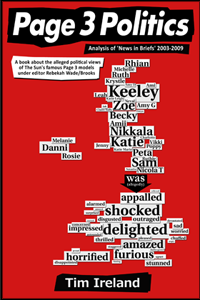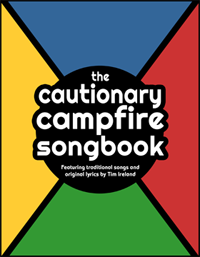Can I just take a quick moment to enjoy being ahead of the curve?
(*self-satisfied grin*)
OK, I’m done. Let’s move on…
I’ve identified some behaviour that is well out of control here in the UK and suggested some corrective measures to the people primarily responsible for the recent decay. They’ve responded directly or via proxy by misrepresenting my position and claiming that I’m bringing tablets from on high and/or calling for fascist measures. If you’ve swallowed this propaganda whole, it may surprise you to learn that I’m apprehensive about a formal code, not least because an informal code already exists (it’s called ‘etiquette’).
That said, let’s take a look at this recent development and see what’s on offer…
New York Times – A Call for Manners in the World of Nasty Blogs: The conversational free-for-all on the Internet known as the blogosphere can be a prickly and unpleasant place. Now, a few high-profile figures in high-tech are proposing a blogger code of conduct to clean up the quality of online discourse. Last week, Tim O’Reilly, a conference promoter and book publisher who is credited with coining the term Web 2.0, began working with Jimmy Wales, creator of the communal online encyclopedia Wikipedia, to create a set of guidelines to shape online discussion and debate. Chief among the recommendations is that bloggers consider banning anonymous comments left by visitors to their pages and be able to delete threatening or libelous comments without facing cries of censorship… Mr. O’Reilly said the guidelines were not about censorship. “That is one of the mistakes a lot of people make – believing that uncensored speech is the most free, when in fact, managed civil dialogue is actually the freer speech,” he said. “Free speech is enhanced by civility.”
O’Reilly Radar – Call for a Blogger’s Code of Conduct: I was quoted in a BBC article a few days ago and a San Francisco Chronicle article on Thursday calling for a “Blogger’s Code of Conduct” in response to the firestorm that has arisen as a result of Kathy Sierra’s revelation that she’s been targeted by a series of increasingly violent and disturbing anonymous comments on her blog and on a series of weblogs that appeared to have been created for the purpose of celebrating cyber-bullying… In a discussion the other night at O’Reilly’s ETech conference, we came up with a few ideas about what such a code of conduct might entail. These thoughts are just a work in progress, and hopefully a spur for further discussion.
OK, here’s what Mr O’Reilly has so far:
1. Take responsibility not just for your own words, but for the comments you allow on your blog.
Well said. Iain Dale and Paul Staines… are you paying attention? One of my major concerns has been what you breed under comments. This is worth repeating; If you run a weblog that contains a significant level of political discussion, you really should have some form of comment registration in place or be ready to moderate your arse off. If you don’t do either, you lay fertile ground for anonymous bullies who seek to limit free speech by undermining and intimidating those they don’t agree with (while simultaneously screaming about their right to free speech).
2. Label your tolerance level for abusive comments.
Psst! Iain! It is implied that you should also follow your stated policy, not use it selectively to engage in self-serving censorship.
3. Consider eliminating anonymous comments.
Iain Dale tried this for a few days and didn’t like it. Staines would never go for it. Both regard the number of comments they receive to be a key indicator of their popularity.
4. Ignore the trolls.
Generally a good policy, but sometimes trolls deserve a public slapping. It is certainly not constructive behaviour to actively use (and thereby encourage) trolls to avoid pertinent questions.
5. Take the conversation offline, and talk directly, or find an intermediary who can do so.
Problematic in the extreme. I fail to see how this can be done when the perpetrator usually insists on remaining anonymous… and is generally the type of person who fears an open and honest discussion.
6. If you know someone who is behaving badly, tell them so.
Done. But the relevant comments got deleted (after being classified as ‘abuse’) and resulted in a stream of abuse from anonymous contributors to the blogs in question (see: #1, #2 and #3). The only measure left was to create a focused information channel that made ongoing reports on an ongoing situation; this was quickly misrepresented by anonymous bullies as an example of ‘cyber-bullying’.
In another recent example, I told the superiors of the anonymous bullies what was going on, and they didn’t give a rat’s arse.
7. Don’t say anything online that you wouldn’t say in person.
A good rule, but… do you behave differently when you’re behind the wheel of a car? Most people do… it’s human nature. I think the best we can expect is a reduction in highly damaging behaviour by approaches/improvements somewhere between #1 and #4. (Me personally, I have a rule that’s not far from #7 in this draft… never put anything on your blog that you wouldn’t want to see on the front page of a newspaper.)
In closing (for now), I’m extremely happy that this long-overdue conversation has gone mainstream… but you should watch out for those who seek to poison this conversation as they do many others. Their main weapon will be to portray aspiration as a proposal for regulation.



